At the Wexford Opera Festival this autumn you could see a bicentenary performance of Verdi’s La traviata. Likewise Donizetti’s L’elisir d’amore. But that’s not why Ireland’s operatic showpiece is one of the most famous, admired and respected events on the European opera calendar (to prove it, Opera Europe, the forum for all companies across the continent, held one of its annual conferences in Wexford this autumn).
The reason is quite simple. It’s repertoire. Since Dr Tom Walsh founded Wexford in 1951, spurred on by the writer and polymath Sir Compton Mackenzie, and helped along by legendary director Peter Ebert (who died in 2012 aged 94), the festival has, virtually from the outset, concentrated on staging operas you’ve probably never heard of.
This year’s Verdi and Donizetti are performed by students, with piano accompaniment. There is also a worthy but unsuccessful staging of The Sleeping Queen by Michael Balfe, one of Ireland’s most successful singers and composers – his The Rose of Castile opened the very first postwar festival. Training and promoting young talent is a key part of every festival’s proceedings.
All the three (or here, four) operas mounted with orchestra in the main house are rare ones. First came The Florentine Straw Hat, or Il Cappello di Paglia di Firenze (pictured below). All Wexford’s principal operas are sung on the original language - and that includes those in Czech, Polish or Russian, which more than occasionally feature in its programmes.

Il Cappello’s composer and co-librettist is Nino Rota. Yes, the composer of film scores for Coppola’s The Godfather and countless Fellini masterpieces saw himself primarily as a composer of opera and oratorio. Some of it is on disc, if you care to seek it out. This one is pure gold. Sergio Alapont oversaw the electrifyingly played, tongue-in-cheek score, full of intelligent and witty borrowings, and the production by Andrea Cigni proved funny, frenetically inventive, cleverly conceived, always on the nub. Invidious, indeed impossible to pick individuals: in a team triumph; every whiff of characterisation was brilliant without exceptio. We split our sides.
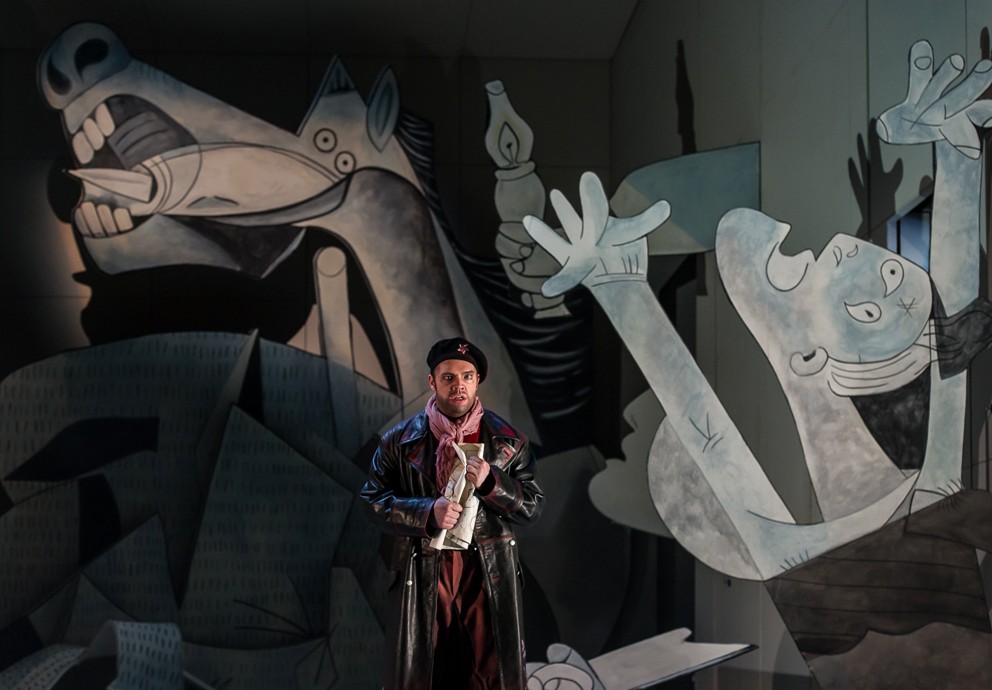 Then came a double bill of Massenet: not so impeccably pulled off, but impressive nonetheless, not least for the high – and at times superlative - quality of the singing. Opinion divided as to whether Thérèse, set in the French Revolution at the time of the Girondistes, was the better; its star performance came from Brian Mulligan as André Thorel, a Danton ally inevitably marched off to the guillotine shouting “you’ll be next”, and one of half a dozen tip-top baritones and bass-baritones in this festival). La Navarraise in the second half (Mulligan pictured above) had a strong claim, updated slightly wonkily but acceptably to the Spanish Civil War (they tell us somewhere that Franco’s planes joined in the bombing of Guernica; I had thought it was just Goering’s Luftwaffe).
Then came a double bill of Massenet: not so impeccably pulled off, but impressive nonetheless, not least for the high – and at times superlative - quality of the singing. Opinion divided as to whether Thérèse, set in the French Revolution at the time of the Girondistes, was the better; its star performance came from Brian Mulligan as André Thorel, a Danton ally inevitably marched off to the guillotine shouting “you’ll be next”, and one of half a dozen tip-top baritones and bass-baritones in this festival). La Navarraise in the second half (Mulligan pictured above) had a strong claim, updated slightly wonkily but acceptably to the Spanish Civil War (they tell us somewhere that Franco’s planes joined in the bombing of Guernica; I had thought it was just Goering’s Luftwaffe).
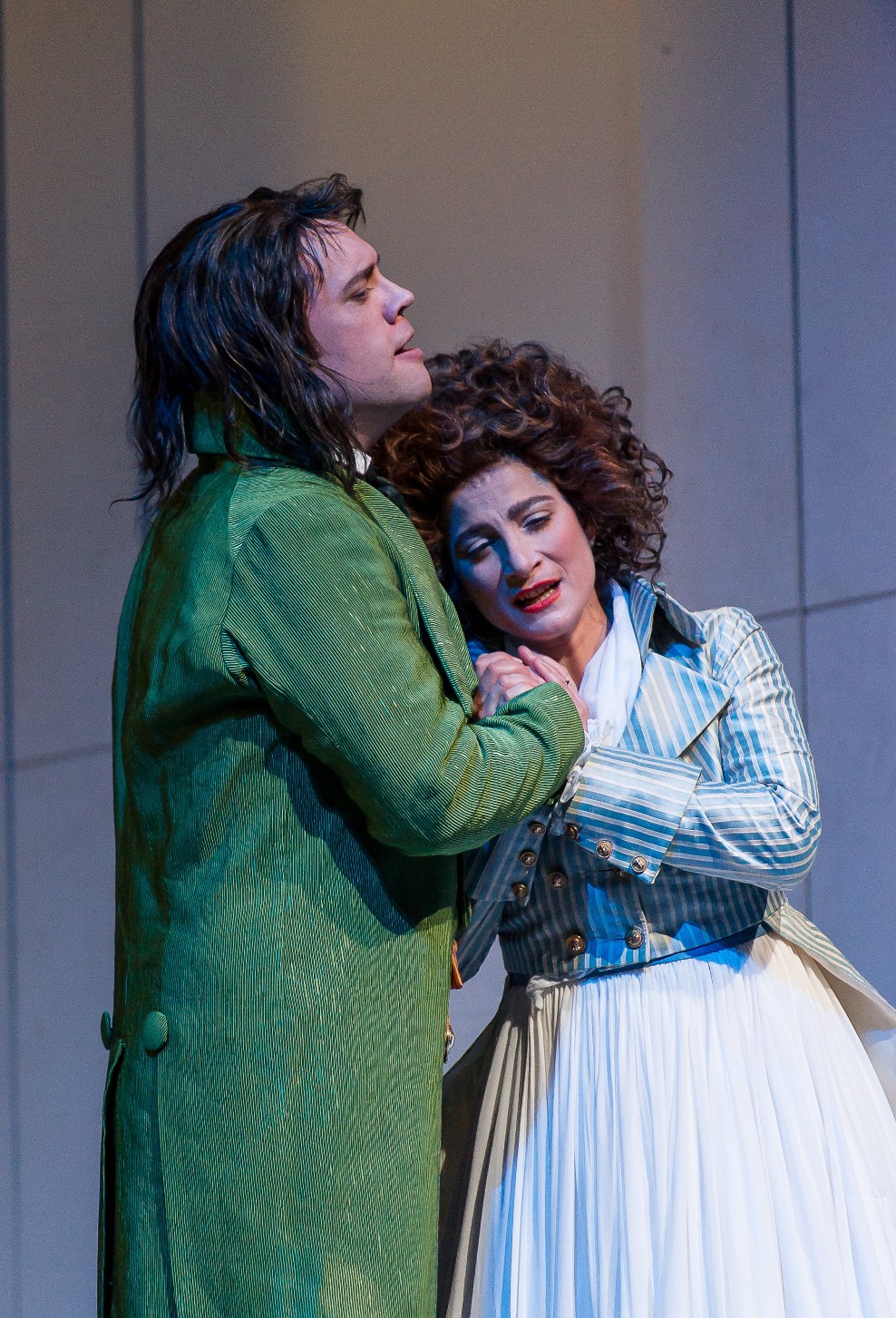 In Thérèse, the love interest, Nora Sourouzian (pictured right with Mulligan), struck me as pretty dull, but a royalist escapee, the wide-ranging tenor Philippe Do, proved quite something. Sourouzian was more interesting as lovelorn Anita in La Navarraise, though - despite a nice final coup de théâtre or tragic dénouement in Barbe’s production - never quite hit that crucial spot. The opera ought to be as taut as any of Puccini’s, and Massenet’s music in both one-acters is amazingly competent, and more. Yet the impact and import alike seemed, on the whole, dim. By contrast, Carlos Izcaray lead things powerfully from the pit: the score glistened. Everyone pilfered Massenet - given the dates, he and Puccini surely pinched from one another - and you can hear why.
In Thérèse, the love interest, Nora Sourouzian (pictured right with Mulligan), struck me as pretty dull, but a royalist escapee, the wide-ranging tenor Philippe Do, proved quite something. Sourouzian was more interesting as lovelorn Anita in La Navarraise, though - despite a nice final coup de théâtre or tragic dénouement in Barbe’s production - never quite hit that crucial spot. The opera ought to be as taut as any of Puccini’s, and Massenet’s music in both one-acters is amazingly competent, and more. Yet the impact and import alike seemed, on the whole, dim. By contrast, Carlos Izcaray lead things powerfully from the pit: the score glistened. Everyone pilfered Massenet - given the dates, he and Puccini surely pinched from one another - and you can hear why.
Annually one of the three operas at Wexford usually claims the laurels ; I can cite Goldmark’s The Queen of Sheba, Weinberger’s Švanda the Bagpiper, Fauré’s Pénélopé, Foerster’s Eva, or Fibich’s Šarka - one of several previously conducted by the hugely successful, shrewd current Artistic Director, David Agler. Although the Rota ran it close, or (some might say) bettered it, Stephen Medcalf’s production with his frequent collaborator, designer Jamie Vartan, of Queen Christina – Cristina, regina di Svezia – by Jacopo Foroni, another of those relatively short-lived Italian composers, was surely the big hit.
Next page: three star voices in Foroni's rarity
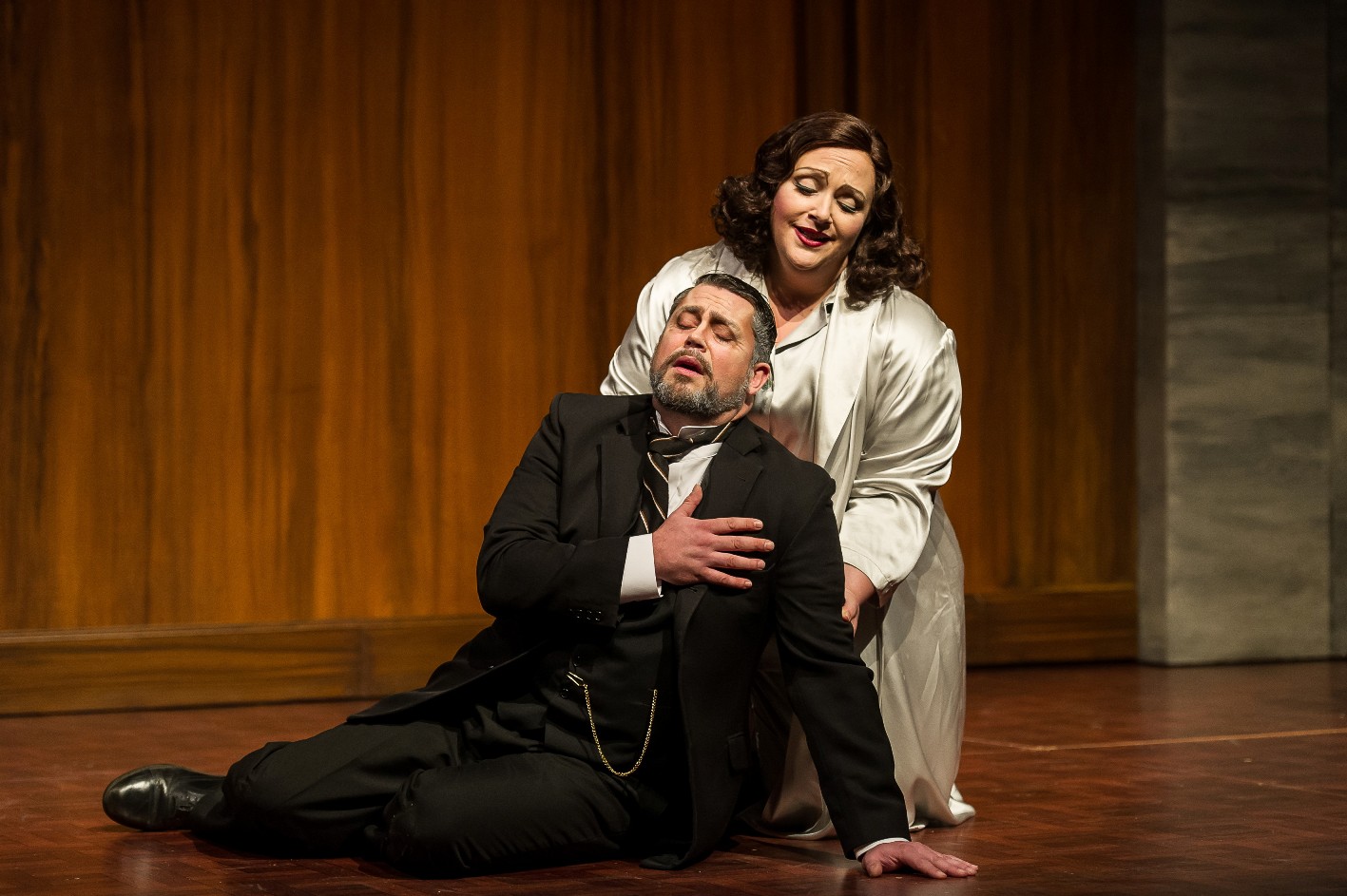
David Stout and Helena Dix in Wexford's 'Cristina, regina di Svezia'
For many reasons. Foroni is a complete unknown (he doesn’t even merit a place in Grove Opera, or in that musical bible, Michael Kennedy’s Oxford Dictionary of Music). If some were inclined to compare him less favourably with Donizetti or Bellini or even Mercadante (Verdi is something else), I don’t agree. While the text of Giovanni Carlo Casanova’s libretto had touches of thin or hackneyed imagery, especially in Act I, the structure of the piece is beyond reproach.
Daughter of the great Gustavus Adolphus, legend of the 30 Years’ War, Cristina (the stupendous Australian-born Helena Dix), having ruled since childhood, faces the Elizabeth I dilemma – whether to marry her Leicester- or Essex-like favourite, de la Gardie (the rather splendid tenor John Bellemer) or remain a virgin queen and outface a growing uprising.
English baritone David Stout was superlative – visually authoritative, vocally magnificent as I’ve never heard him - as the queen’s chief adviser, whose family unfortunately adds to the pressures on her. Stour will sing Monterone in ENO’s Rigoletto next February, and it might be worth going just for him.
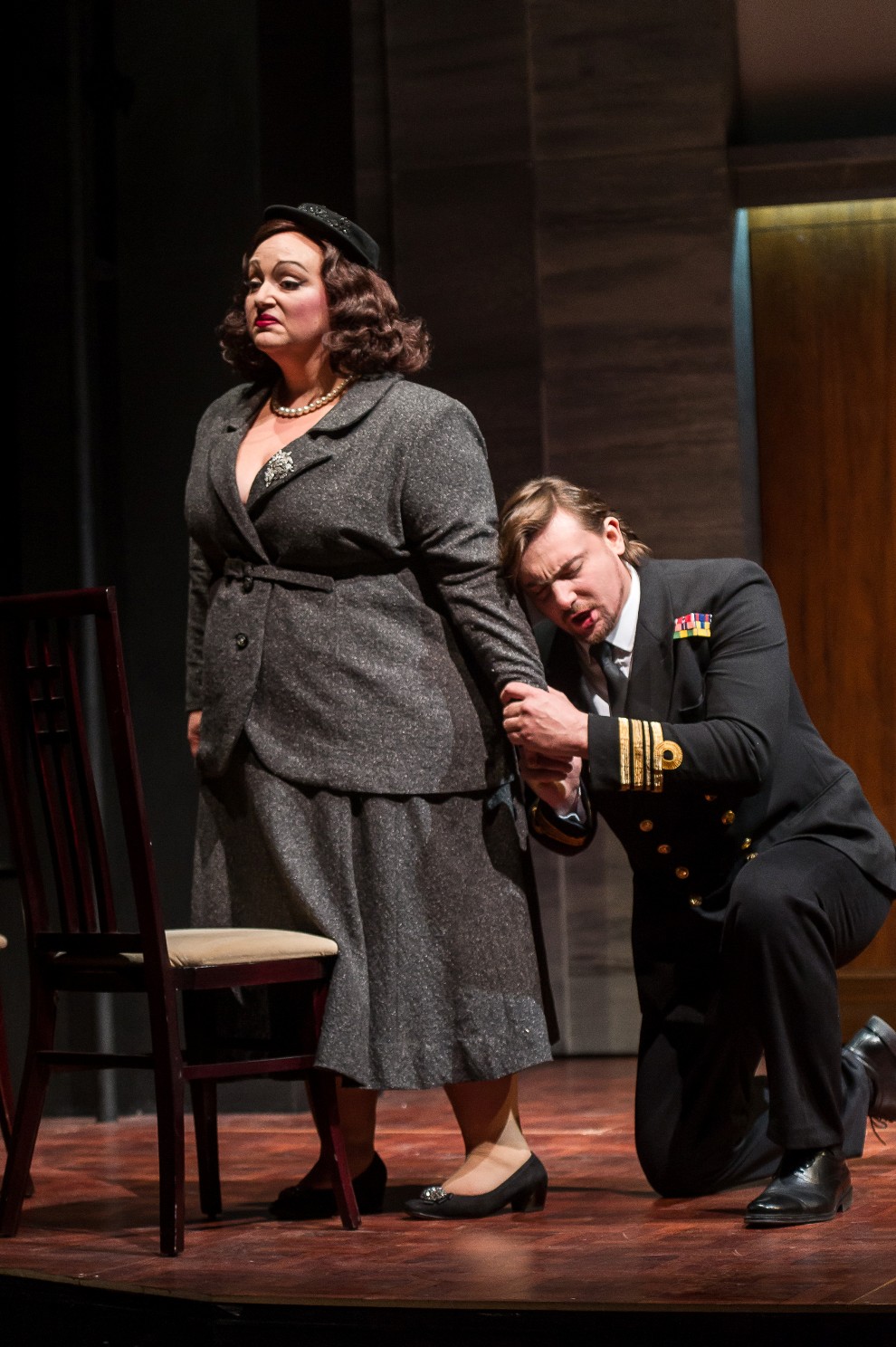 But the wonder among this male-dominated production was Russian baritone Igor Golovatenko (pictured right with Dix), as the queen’s cousin and nominated eventual successor, Carl Gustav. I would travel Europe to hear this voice and see this massive onstage presence. Bolshoi – and indeed Paris – star he may be, but the Royal Opera and the Met should move mountains to get this man on board. Golovatenko was the big sensation of this year’s Wexford – and his noble-cum-scary characterisation was as riveting as the voice.
But the wonder among this male-dominated production was Russian baritone Igor Golovatenko (pictured right with Dix), as the queen’s cousin and nominated eventual successor, Carl Gustav. I would travel Europe to hear this voice and see this massive onstage presence. Bolshoi – and indeed Paris – star he may be, but the Royal Opera and the Met should move mountains to get this man on board. Golovatenko was the big sensation of this year’s Wexford – and his noble-cum-scary characterisation was as riveting as the voice.
But Dix carries the evening. Without being rude, it was really a case of the fat lady sings (I’m portly myself, so can perhaps intimate that). But Dix’s physical weight actually gave her a massive presence too. Foroni demands a lot of coloratura from the hapless Cristina; Dix has it all, and in an unusual way.
She can actually do coloratura low down, so the voice welled up from mezzo or even contralto range to Allegri-like peaks even a boy (or girl) treble couldn’t match. There was vibrato, but wondrously little: it lends a sheen, a poignant colouring, but she never plasters it all over you like her legendary fellow-Australian, Dame Joan Sutherland.
Dix’s presence, especially in two later scenes where she trundled across the stage in voicing her dilemma, was psychologically massive. She evinced loneliness – an important operatic leitmotif, think of Britten’s Gloriana or Captain Vere, or countless figures in Verdi - big time. The fact that Cristina abdicates at 27 only makes the pathos bigger. Dix is a star, and, as with Golovatenko, the major US and European companies haven’t begun to utilise her fully. More fool they.

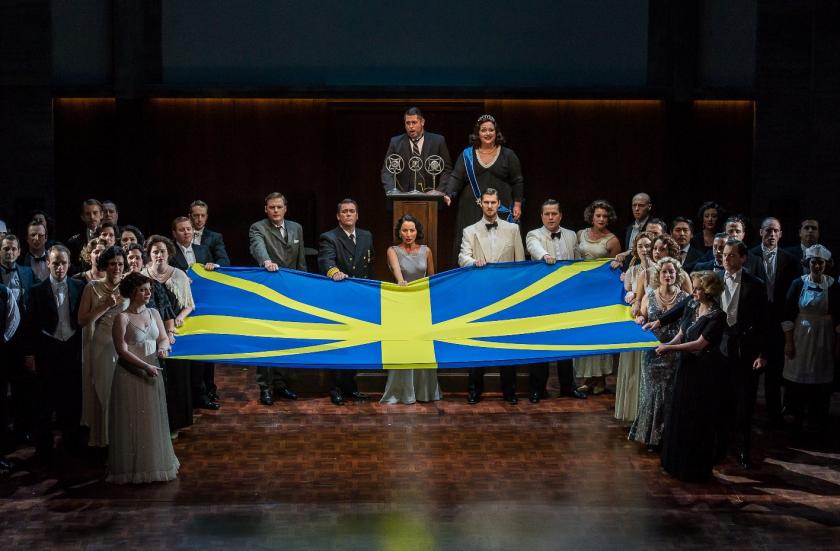












Add comment